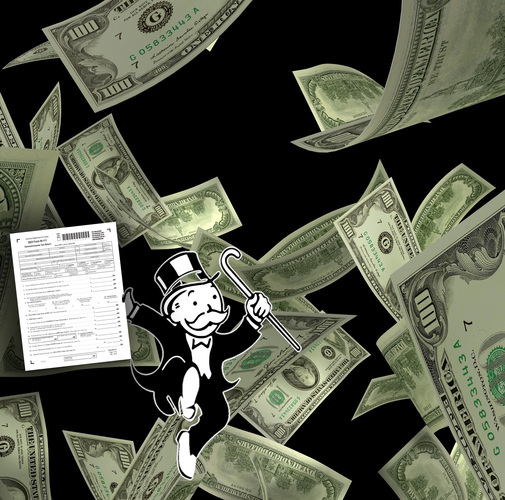Chuck Collins is co-editor of Inequality.org and author of the recent, Vermont-based novel Altar to an Erupting Sun. See the letter at fairsharevt.org/wealthy-letter.
GUILFORD-As the Vermont Legislature debates how to pay for housing solutions - and Gov. Phil Scott laments that "there just isn't any money" - a group of 35 high-income Vermonters have suggested a path forward: raise their taxes.
In a public letter to Vermont state legislators, they write: "As Vermonters who have economically prospered in our state, we believe in contributing our fair share to build a state that works for all people who live here."
They support a tax proposal that will increase taxes on the highest-income Vermonters, which would raise $74 million each year. On Friday, March 29, the proposal was passed by the Vermont House, with this revenue being directed toward addressing Vermont's housing crisis.
Signers include Ben Cohen and Jerry Greenfield of Ben & Jerry's, Olympic ski champion Hannah Dreissigacker, Phoenix Books co-owner Renee Reiner, Magic Hat Brewing Company co-founder Alan Newman, and green-energy entrepreneurs David Blittersdorf and Duane Peterson.
Understandably, this might not compute for most readers. After all, we are flooded daily with stories of billionaire venality, excess, influence, and power. Over the past few years, ProPublica has revealed the plentiful techniques deployed by the ultra-wealthy to avoid paying taxes.
So why would these Vermonters, in the face of a severe housing crisis, publicly endorse higher taxes on themselves?
* * *
I know from co-organizing this effort that this is only the tip of the iceberg of support among those who would pay. Many more high-income Vermonters support this proposal but do not wish to go public.
We live in a state of small, face-to-face communities. Most high-income Vermonters, whether they are recent arrivals or have their family name on the road signs, quietly pay their state income taxes without complaint. They want to keep a low profile.
These Vermonters are not unusual. A global poll of millionaire households in G20 countries found significant support for higher taxes on themselves.
A January poll found that 74% of millionaire households support targeted income and wealth taxes to address the cost of living crisis and improve public services; 72% think that extreme concentrations of wealth corrupt our political system, with 54% believing it to be a threat to democracy itself.
You will hear the fear that higher taxes may drive affluent Vermonters away. But this notion of the fleeing millionaire is a myth.
Like all Vermonters, our wealthy neighbors appreciate the quality of life and public investments in the state. And frankly, if someone's decision about where to live were dictated by income taxes, they probably would have moved to the "live free or die" state a long time ago.
* * *
Those who remain in Vermont have chosen to live in a state where people care for each other and the land we share. As their letter states, "Here in Vermont, we take care of our neighbors and form close relationships that transcend economic circumstances. Public investment, funded through tax dollars, is necessary to amplify these community efforts and fund programs that strengthen our communities."
These are folks who understand that their neighbors are being pushed out of their communities due to a lack of affordable housing, high property taxes, and other factors. By paying a bit more income tax, these affluent Vermonters will also benefit from a healthier, more-just state.
The alternative is to either ignore urgent needs or increase housing investments by taxing everyone else. At a time when many Vermonters may already feel squeezed, this group believes those with the greatest capacity should pay more.
* * *
Vermont lawmakers in the House, led by House Ways & Means Committee chair Emilie Kornheiser, have put forth a proposal to increase taxes on incomes over $500,000 (over $410,650 for individuals) by 3%. Under the plan, the funds will be invested in affordable housing initiatives, including emergency shelter, permanently affordable rental housing, and assistance for first-time homebuyers.
Over the next decade, this tax will contribute to almost $900 million for long-term solutions to our housing crisis. Only the top 1% of Vermont taxpayers would pay this additional rate.
Some cynics will trot out the tired canard, "Go ahead, you can contribute more to the state treasury." That is like cleaning up a river by each neighbor volunteering to dump less and pick up litter. Taxes are how we all pay for what's important. It is not voluntary charity.
As one of the signers, entrepreneur Duane Peterson, told Seven Days, "Societal needs are better identified by elected representatives than left to the whims of philanthropists. Some Vermonters have huge wealth. Contributing more won't change their lifestyles but can really strengthen society."
If you doubt that our communities are facing an acute housing crisis, step out your door and talk to your neighbors.
And if you think, "There isn't any money," listen to the signers of this letter.
This Voices Viewpoint was submitted to The Commons.
This piece, published in print in the Voices section or as a column in the news sections, represents the opinion of the writer. In the newspaper and on this website, we strive to ensure that opinions are based on fair expression of established fact. In the spirit of transparency and accountability, The Commons is reviewing and developing more precise policies about editing of opinions and our role and our responsibility and standards in fact-checking our own work and the contributions to the newspaper. In the meantime, we heartily encourage civil and productive responses at [email protected].
